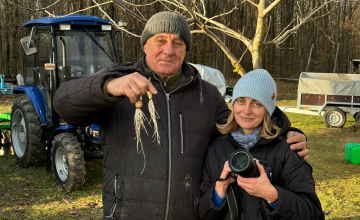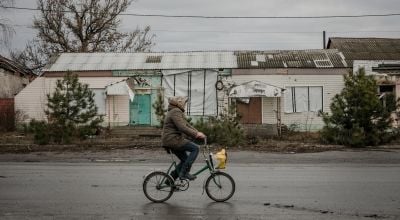
Read our 2023 annual report

Knowledge Hub
Three years on from the beginning of the conflict in Ukraine, people are trying to rebuild their lives amongst the continued hostilities. Grants are helping business people get back to their careers and provide for their families.
As of October 2024, according to the Ministry of Social Policy, more than 4.6 million people are officially registered as internally displaced within Ukraine. That’s one in eight people. Out of them, an estimated 2.8 million people are in need of humanitarian assistance.
Since the escalation of conflict on February 24 2022, lives have been shattered across Ukraine. Millions fled to neighbouring countries, while many have moved to different areas of the country. For those who remain within Ukraine, not only must they contend with the psychosocial impact of ongoing conflict, but with widespread employment.
The number of internally displaced people (IDPs) registered with the State Employment Service increased almost fivefold between 2021, before the conflict, to 2022 - from 12,300 to 61,900. The biggest increase in registered unemployed IDPs was observed in the west, far from active war zones.

Concern has been working within Ukraine since 2022 as part of JERU, our Joint Emergency Response with Welthungerhilfe. In consortium with our Alliance2015 partner Helvetas, we have implemented a livelihoods programme focusing on the transition of households away from humanitarian assistance, and into early recovery activities that involve grant and mentoring support for small and medium enterprises. Programme participants - many of whom have been displaced more than once over the past three years - were given the opportunity to undergo internships and training, as well as to receive grants to develop and restore their businesses.
Among them was Ivan Zakharenko, a farmer from Zaporizhzhia Oblast in south-east Ukraine.
Ivan's story
As told to Oleksandra Titorova
In 2008, Ivan’s mother-in-law found two heads of garlic in an abandoned field. Their family used a few of the garlic cloves for dinner, and were stunned by what they tasted. The cloves were rich and spicy, reminiscent of chilli peppers. This chance discovery grew into a business and Ivan’s life’s work, named after his mother-in-law, Lyubasha.
From those two bulbs, Ivan grew four hectares of garlic in the next six years. He joked: “My father-in-law won a lot of bets with people who claimed they could eat tons of garlic. He would bet whether they could eat two cloves or not. And he won every time because the garlic is so spicy, and the cloves sometimes reach 40 grams. They’re huge.”
The uniqueness of Ivan’s crop - from its taste, to its size - meant that Lyubasha became a successful product around the world, with customers ordering from Europe, Canada and Japan. The entire family became involved in the business, and it was booming. However, one day, missiles flew above Ivan’s home, and everything changed.

Ivan and his family remained at home amidst occupation for two difficult months, before making the decision to leave. Nine members of the family piled into one car with a bag each, as well as a suitcase with documents for their garlic. It took them 14 hours to travel 40 kilometres, passing through 12 checkpoints until they reached safety. They eventually moved further west to Khmelnytska Oblast, far from their community and the land they used to build Lyubasha.
"The grant gave us hope"

Six months after being forced to flee, Ivan rented a three-hectare plot to restart his business. After buying five tonnes of garlic from his customers, he was able to sow this land and begin producing his garlic again. But he did not have the same equipment to run Lyubasha as he had at home.
Then, Ivan learned about the opportunity to receive a grant for small and medium-sized entrepreneurs from JERU. He was successful in his application, and Ivan used the grant to purchase the equipment needed to expand Lyubasha again, including a tractor, an agro-navigator, a trailer and a cultivator. The grant allowed Ivan not only to progress his business, but to distract himself at a time of great stress for his family and friends.
“The grant gave us hope, first of all,” he said. “We realised that we can do something. This is the most important thing. We even stopped missing our homeland so much. We switched to work. We had something to do. This is very important. We realised that next year we would do even better.”
Ivan has now been able to hire three people, and hopes that by 2027, he will have returned to his pre-conflict staff of 12.

Within the two first years of this project, JERU has already provided 170 grants to micro, small and medium businesses. Another entrepreneur who received a grant was photographer Iryna Kotelnykova, who fled her home in Kharkiv due to bombardment. She has since used the grant to restart her photography business, taking portraits of women and families. She also took the pictures of Ivan you see in this story.
Concern's work in Ukraine
As part of JERU, Concern continues to provide humanitarian assistance in the north, east and southern regions of Ukraine. This assistance includes cash transfers, winterisation, the repair of shelters, livelihoods, protection and the distribution of food, hygiene and solid fuel items.
Through the strategic pooling of resources and combined reach, JERU is supporting people across Ukraine - including internally displaced persons, returnees and communities living near the frontline - in dealing with the harsh realities of the conflict.





